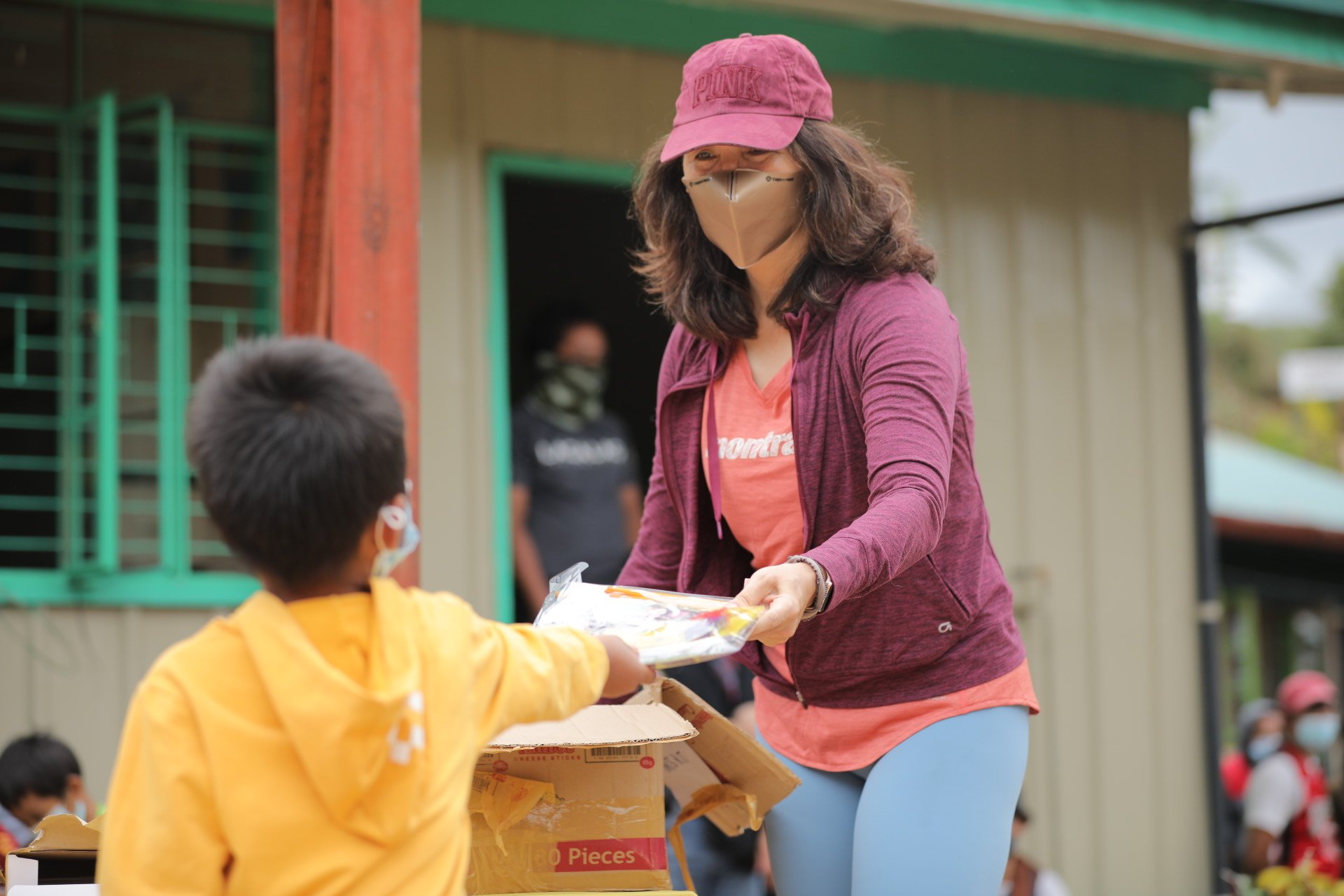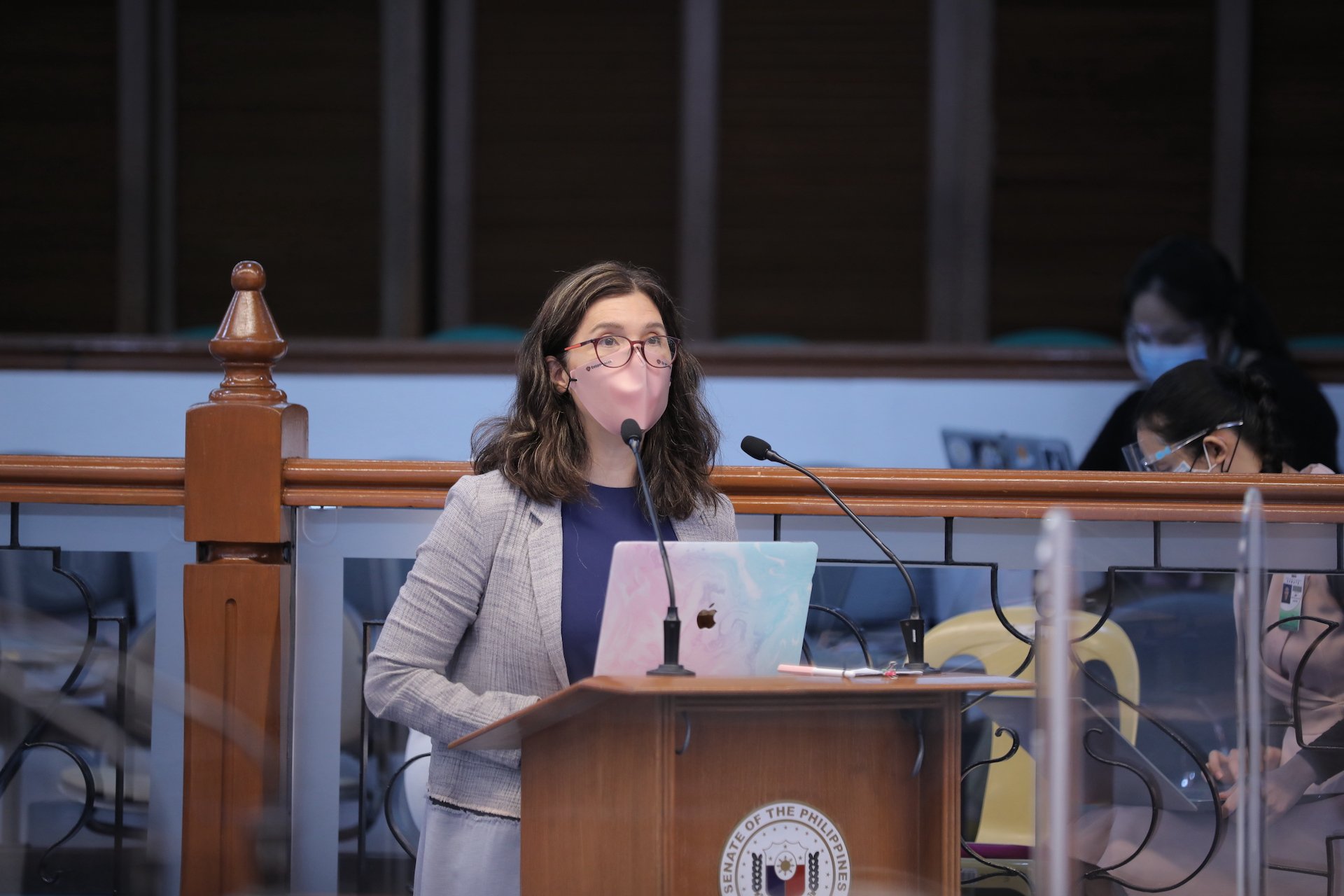26 April 2011, Tuesday
Alabang Country Club, Ayala Alabang Village
Film Showing on Maternal and Child Health
Last March I sponsored a film showing on the “state of maternal and child health in the Philippines” in the Senate. After the film showing was an open forum to discuss the thoughts and reactions of the viewers. We felt that the film was a great way to educate people on the plight of women and the issue of women and child health, and thus launched a series of film showings throughout the country.
Last week, I showed the films in Barangay Ayala Alabang Village where I live. We invited residents and different groups including, former Health Secretary Esperanza Cabral, a resident of Alabang and the barangay officials who, unfortunately, were unable to attend. Early this year, Barangay Ayala Alabang enacted Barangay Ordinance No.1, Series of 2011 which, among others, expanded the definition of abortifacients and restricted the use of contraceptives within its jurisdiction. I raised my concerns on the said Ordinance in a letter I sent to Muntinlupa City Mayor Aldrin San Pedro. (Below is the text of the said letter).
These films were among the entries in the recently concluded 2nd Quisumbing Escandor Film Festival (QEFF2) sponsored by the Mu Sigma Phi Fraternity of the University of the Philippines College of Medicine.
The Alabang film showing featured five films – four short films and one documentary, namely:
- Sa Direksyon ni Makoy: Da Final Cut (QEFF2 Jury’s Pick for Best Short Film) Directed by Genevieve Caberte
- Badong Buntis
- Ang Ina (QEFF2 Jury’s Pick for Best Documentary), Directed by Mr. Donnie Sacueza
- Tinalikdan, Directed by Edgar Baltazar
- Limang Libo (QEFF2 Grand Prize Winner), Directed by Aiza Jane Idanan
*For more details on the films, please log on to senatorpiacayetano.com or pinayinaction.com
Many of us have strong opinions on the topic of Reproductive Health, but very few know what the lives of women who have no access to health services are like- how the lives of their children and spouses are affected. Unless we walk in their shoes, we have very little understanding of their sufferings and the day to day difficulties they deal with.
These films tell their stories. They highlight the sad reality that the Philippines has the highest maternal mortality in the region. 11 mothers die each day. 500,000 abortions occur every year.
After the films were shown, we had a forum which was moderated by Dr. Bryan Lim of our partner organization, Mu Sigma Phi Fraternity. It was a lively discussion. I tried to answer questions raised and clarified misunderstandings on a number of issues. Dr. Gregorio T. Alvior, Jr. of the PGH Foundation also answered many questions.
Once again, I thank the Mu Sigma Phi Fraternity without whom this joint project of ours would not be possible.
For my blog on the launch of the film showing.
Meanwhile, the Senate Committee on Health, which I chair, continues to hold hearings and technical working group meetings on the Reproductive Health bill. In fact, as we are now on recess from session, my staff and I are reviewing and revising the working draft, taking into consideration the various inputs from our resource persons.
************
My letter to Mayor San Pedro of Muntinlupa City re Barangay Ordinance no. 1 of Ayala Alabang
7 March 2011
The Honorable
MAYOR Aldrin L. San Pedro
City Government of Muntinlupa
Philippines
Dear Mayor San Pedro,
I am writing as a concerned resident of Muntinlupa City and an elected public official of the Republic of the Philippines.
I would like to put on record my concerns with respect to Ordinance No. 1 “AN ORDINANCE PROVIDING FOR THE SAFETY AND PROTECTION OF THE UNBORN CHILD WITHIN THE TERRITORIAL JURISDICTION OF BARANGAY AYALA ALABANG; FIXING PENALTIES FOR ITS VIOLATIONS, AND, FOR OTHER PURPOSES” of Barangay Ayala Alabang for consideration in the public hearing set by the Sangguniang Panglungsod on March 19, 2011.
At the outset, I would like to inform the body that the Senate Committee on Health and Demography, joint with the Senate Committee on Youth, Women and Family Relations, both of which I chair, is currently in the process of finalizing the reproductive health committee report. We have already conducted three hearings and four technical working group meetings.
With respect to Ordinance No. 1 of Barangay Ayala Alabang, it is my humble submission that the Barangay arrogated to itself powers it does not have and which Congress specifically granted to certain government agencies.
In this case, it is the Department of Health (DOH), through the Food and Drug Authority (FDA), which has the mandate and the authority to regulate drugs. The DOH is responsible for ensuring access to basic public health services to all Filipinos through the provision of quality health care and regulation of providers of health goods and services while the FDA is the national government agency which ensures the safety, efficacy and quality of health products, including drugs and medicines.
I am the author and sponsor of Republic Act No. 9711, the Food and Drugs Administration (FDA) Law, which gave the FDA the exclusive power to regulate food, drugs and other devices, with public health and safety as its foremost concern. This measure was enacted into law in the 14th Congress. I still chair the Senate Health Committee in the 15th Congress and I am not aware of any law or bill authorizing the transfer of the power to regulate drugs from the FDA to any agency of the government, more so to any local government unit. Since time immemorial, that power has been lodged by Congress in the FDA, which was formerly known as the Bureau of Food and Drugs (BFAD). The exercise by Barangay Ayala Alabang of the powers embodied in the Ordinance amounts to usurpation of power.
Section 4 of the Ordinance defines an abortifacient, to wit:
Abortifacient – is any device, medicine, substance or practice which may damage, injure, interfere with the natural development, endanger or cause the expulsion or death of an unborn child; except for such devices, medicines, substances or practices which are standard medical treatments for medical conditions which threaten the life or physical health of a pregnant woman or an unborn child, when used to treat such medical conditions, and neither the primary effect nor purpose of such device, medicine, substance, or practice is to cause the termination of a pregnancy or prevent conception. Abortifacients include Intrauterine Devices (IUD’s), and hormonal contraceptives, as well as any and all other devices, medicines, substances or practices which fall within the foregoing definition, including but not limited to the list hereto attached as Annex A entitled as List of Hormonal Contraceptives. This list shall be updated from time to time as the need arises. (emphasis supplied)
Although a barangay has the power to define terms in its ordinance, the definition should be consistent with the policies of the proper government authorities. The DOH and FDA provide guidelines for the safety and efficacy of contraceptives, to wit, DOH Administrative Order 2010-0027 which seeks to “formulate and implement critical policies and plans, complementary actions and supportive measures which are necessary to improve access to family planning (FP) services and to ensure reproductive health (RH) commodity security to eliminate unmet needs for FP/RH services.”
The definition and policy laid down in the Ordinance likewise violates internationally-accepted principles and guidelines such as the World Health Organization’s Model List of Essential Medicines, which includes IUDs and pills, among others. For the past 30 years, the Model List has led to a global acceptance of the concept of essential medicines as a powerful means to promote health equity. The act of the Barangay in expanding the definition of terms in the Ordinance is illegal and is an ultra vires act.
These are just some of the legal infirmities of Ordinance No. 1 of Barangay Ayala Alabang.
We live in a civilized society governed by the rule of law. Government officials, including barangay officials, cannot arrogate upon themselves powers that do not belong to them, nor can they pass local legislation that contravene existing laws and policies. To allow this will result in anarchy. Any action taken by the Barangay must always be done in accordance with law.
May God bless our country and our people!
Very truly yours,
(sgd)
SENATOR PIA S. CAYETANO
Chairperson
Committee on Health and Demography
Committee on Youth, Women and Family Relations
Copy furnished:
Vice Mayor Artemio A. Simundac
City of Muntinlupa
Mr. Freddie Xerez-Burgos
Chairman
Barangay Ayala Alabang










